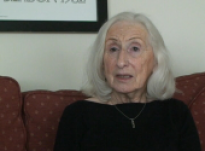Sylvia - Interview 7

More about me...
Sylvia had an Orthodox background and though she is less observant over the years, she keeps the dietary laws and her Jewish identity is very important to her. Sylvia does not think that her health issues are related to her Jewish background.
Sylvia finds that explaining the effects of Crohn's disease to friends and family can be embarrassing because talking about bowel function remains a cultural taboo.
Sylvia finds that explaining the effects of Crohn's disease to friends and family can be embarrassing because talking about bowel function remains a cultural taboo.
Seeing different consultants all the time makes it difficult to build rapport. Sylvia wrote to the Chief Executive about her appointment being put back by six weeks.
Seeing different consultants all the time makes it difficult to build rapport. Sylvia wrote to the Chief Executive about her appointment being put back by six weeks.
Sylvia has found the web a useful resource for finding information on new research and treatments. But some doctors might not like patients reading up on things by themselves.
Sylvia has found the web a useful resource for finding information on new research and treatments. But some doctors might not like patients reading up on things by themselves.
Sylvia stresses the importance of seeing doctors if you have symptoms.
Sylvia stresses the importance of seeing doctors if you have symptoms.
Sylvia said the colonoscopy was better than the barium enema and it was not as bad as she had expected.
Sylvia said the colonoscopy was better than the barium enema and it was not as bad as she had expected.
Sylvia has found her sense of belonging to her synagogue a comfort to her.
Sylvia has found her sense of belonging to her synagogue a comfort to her.
Sylvia carried an emergency toilet card from the National Association for Colitis and Crohn's for a while but felt too embarrassed to use it.
Sylvia carried an emergency toilet card from the National Association for Colitis and Crohn's for a while but felt too embarrassed to use it.
Sylvia was surprised that the stress at work didn't affect her.
Sylvia was surprised that the stress at work didn't affect her.
Sylvia tries to manage flare-ups of the inflammation by going on a very bland diet and avoiding alcohol.
Sylvia tries to manage flare-ups of the inflammation by going on a very bland diet and avoiding alcohol.
No. Simply because I like tasty flavoursome food and to my mind the, you know, pasta, rice and that and even plain fish is okay, but not exciting, so… No so I’ve never thought and obviously if, if the doctors had told me that I would have to, I would, like initially when it was first diagnosed before the operation when they said go on a low fibre diet. I really stuck to that religiously and in the end it didn’t make any difference. But you know, clearly it had worked for a while, but no, I mean providing I feel well on my normal diet you know, if I’ve found I was getting more and more flare ups I wouldn’t do, and you know, this time the doctor hasn’t suggested seeing a dietician or anything so ….
Sylvia was told of a link between Crohn's and eating a traditional Jewish diet high in fats. She still follows the dietary laws of eating kosher, but tries to cut down on fatty foods.
Sylvia was told of a link between Crohn's and eating a traditional Jewish diet high in fats. She still follows the dietary laws of eating kosher, but tries to cut down on fatty foods.
My parents were, they weren’t ultra Orthodox, but very Orthodox, and, we were brought up having a strictly kosher diet, celebrated all the festivals which, you know, food is often, well food is connected with all of them. So yes, it was a very traditional Jewish upbringing. My paternal grandparents, they were ultra Orthodox and so, it wasn’t until quite late on in my marriage, that I actually sort of even tasted non kosher food because we would never eat out of restaurants or anything like that. And even now, I have kosher food, you know, I buy kosher meat. I’m not Orthodox but I buy kosher meat. I keep my meat and milk separately. I don’t eat milk after meat. So, I follow all the dietary laws, except maybe my cooking is a bit healthier than my parents. I don’t use, yes, loads of fat and you know, if I make chicken soup, most of the fat’s gone and things like that. But I do keep, you know, kosher.

